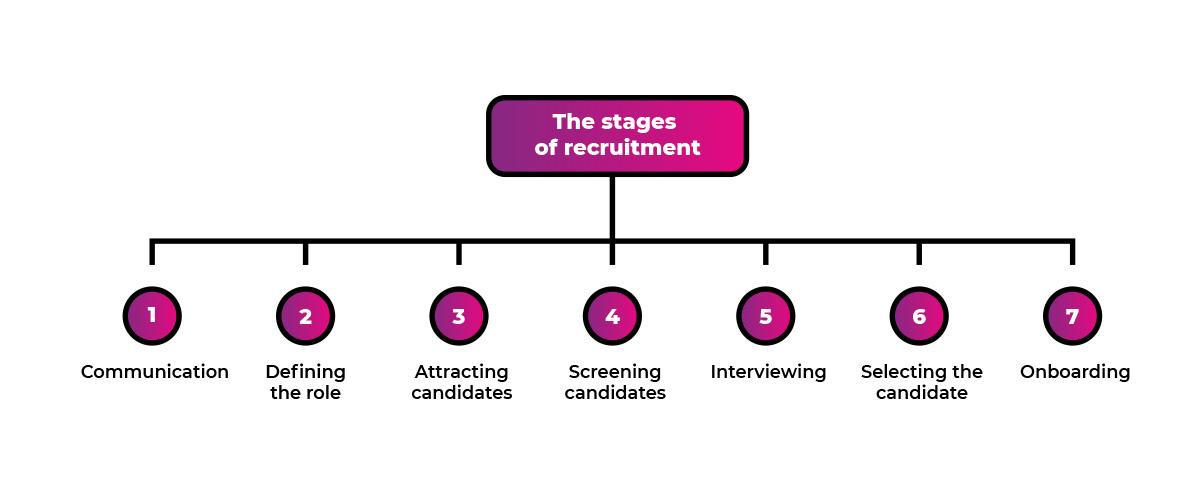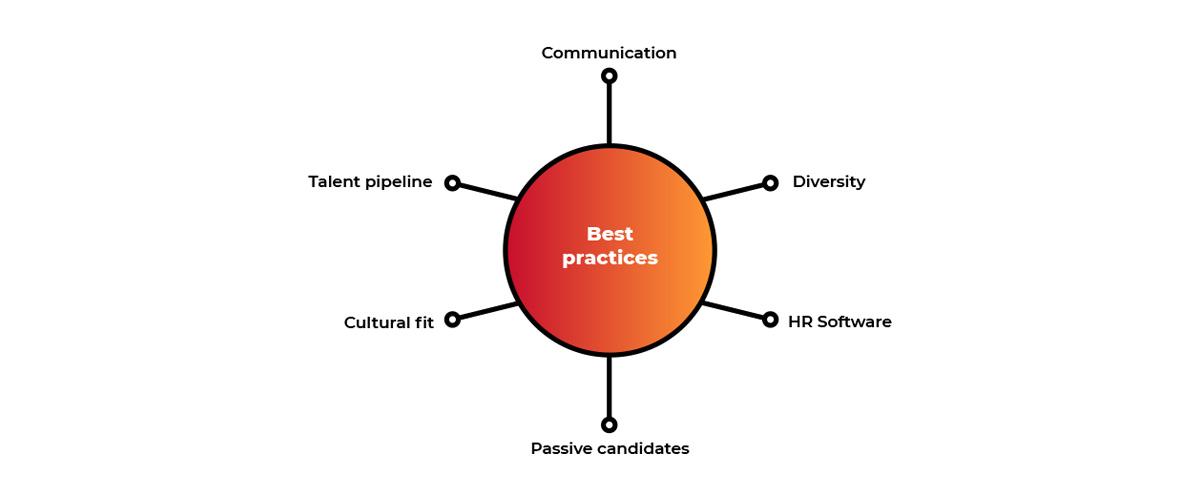Your workplace needs more WOW. Get ready for MHR's World of Work 2026

The ultimate guide to recruitment for your business
Understanding recruitment is critical to getting your business to grow in a healthy and sustainable way.
This comprehensive guide explains why recruitment is important for a business and give you all the tools you need for a more effective recruitment process.
What is recrutiment?
No matter the industry your organization is in, recruitment plays a pivotal role in your business strategy. It involves the process of attracting, identifying, and retaining the ideal candidates for each open position within your company.
Additionally, it's about pinpointing where those vacancies are to ensure your resources are allocated as efficiently as possible. In essence, recruitment is a comprehensive and multifaceted practice vital for your business's growth.
This detailed guide will explain the importance of recruitment for a business and provide you with all the necessary tools for a more effective recruitment process.
Why is recruitment important?
Why is recruitment important?
Labor markets are currently unpredictable, and the competition for top talent is exceptionally fierce. At the end of 2023, there were 9 million job openings available with US companies. Additionally, 60% of organizations report that retaining talent has become more challenging than in the previous year.
Recruitment is not just about filling positions as they become available; it's also about having processes in place to foresee the long-term needs of the business, optimizing the workforce, and ensuring resources are utilized effectively.
Adhering to the best recruitment practices will help you attract and keep the best talent.
Why is your recruitment process important?
Why is your recruitment process important?
Understanding the intricacies of your organization's recruitment process adds significant value to any business. The primary goal of a clear recruitment process is to ensure a consistent candidate experience, which in turn drives results, increases employee engagement, and strengthens your company culture.
Emily Glover, Head of Talent & Resourcing at MHR, states:
"An organization is built on its people and its talent. Without a solid grasp of the recruitment process's importance, you'll find it difficult to grow sustainably.
Effective recruitment is more than just hiring the right person for the job. A quick and efficient recruitment process can lower business costs, improve a company's brand from both a market and candidate perspective, and ensure that the best talent is identified.
An efficient process isn't just about filling an immediate vacancy; it's about impacting the long-term success of the business by finding the most suitable candidate, which ultimately saves time and money on replacing and training new staff."
Who handles recruitment?
While recruitment is commonly seen within HRM departments, they're not the sole group responsible for the recruitment process. In a small business, line managers and CEOs might take the lead, or you might need to outsource to an agency. In larger companies, a dedicated department is usually in place.
It's also important to note that in highly specialized departments (like software development), line managers often have a deeper understanding of the specific skills needed and what an ideal candidate looks like. Their input is crucial and should always be considered. The recruitment process is much stronger when the hiring manager and the recruitment team collaborate effectively.
However, HR should be involved in every stage of the hiring process to ensure it adheres to best practices.
There are several crucial stages in the recruitment process. Although the specifics may vary based on your organization's unique needs, these stages typically remain consistent.

Defining a role
Once you've pinpointed a need, it's crucial to craft a job description that not only addresses those needs but also any additional responsibilities identified during the assessment stage.
If you're filling an existing role, ensure the job description aligns with the current business requirements. Roles often evolve, so relying on outdated job advertisements is not advisable.
It's important to articulate the role clearly and accurately, using language free of bias. This approach will help attract the right candidates for the job.
Attracting candidates
You might already have a robust hiring pipeline and a reputation as a desirable employer. There's a vast array of candidate sources, from in-house recruitment to LinkedIn to employee referral programs.
We delve deeper into this in the next section of this guide, so if you're having trouble drawing in candidates, it could be beneficial to explore new avenues.
It's important to keep tabs on what rival companies are offering their candidates, and see if you can match these offers. Benchmarking and competitor research should be conducted as early as possible, as it will shape your strategy.
Screening candidates
After you begin advertising the job opening through your various channels and job boards, you should start receiving applications. However, 42% of resumes that HR managers receive are from candidates who do not meet the job qualifications.
Screening is crucial to prevent these unqualified resumes from bogging down your hiring process. A comprehensive screening call can save your hiring managers a significant amount of time and prevent wholly unsuitable candidates from moving too far in the process. It can also refine your interview questions, as you'll gain a better understanding of what each candidate has to offer.
Interviewing
The interview is the most pivotal part of the hiring process. This is where you truly get to know a candidate, and they get a chance to learn about you.
Beyond just allowing you to better understand the skills and experience a candidate brings to the table, interviews also provide an opportunity to get a sense of a candidate's personality. Additionally, they allow you to further clarify the job role and your company's expectations.
Selecting the right candidate
At this stage, you should gather all the information you have on each candidate and assess it based on the criteria and needs you identified earlier in the process. Then, you can extend an offer to the most suitable candidate.
You should handle this step and reach out to the successful candidate as quickly as possible. Providing feedback at every stage of the recruitment process through clear and transparent communication will ensure you leave a positive impression, regardless of who is ultimately chosen.
Onboarding
Recruitment doesn't end once you've extended an offer to a candidate; it also encompasses their onboarding. Organizations with a strong onboarding process see better employee retention rates, as high as 82%.
Additionally, up to 50% of candidates who resign may receive a counteroffer. This is where talent management tools become essential, as they help any new hire to integrate more smoothly into the organization.
What are the different types of recruitment?
What are the different types of recruitment?
There are multiple methods for sourcing new candidates, and not all are part of the conventional external recruiting category.
External recruiting
This is likely the first thing you think of when considering recruitment. Previously, this involved newspaper ads, but now it includes reaching out via LinkedIn, commercial job boards, and posting ads on your company's website.
External recruiting services
Also known as outsourced recruitment, this is when you hire an external firm (usually a recruitment agency or consultant) to find, screen, and shortlist candidates for you. This is helpful if you lack the resources for a dedicated recruitment team.
Internal recruiting
Promoting internal career development is essential for enhancing employee experience, so posting new job openings internally is an effective way to fill skill gaps while ensuring employees are fully utilizing their abilities. It's also more cost-effective.
Staffing and temporary recruiting
Temporary staff are perfect for peak times when you're short on key personnel. While office temps typically handle administrative tasks, temp agencies can provide a variety of staff to meet your needs.
Employee referrals
A positive company culture can lead to employees recommending their friends and former colleagues. Referral incentive programs can encourage this practice.
Outplacement recruiting
Outplacement involves supporting employees who have been laid off in finding new employment.
Student/ Graduate recruiting
Students and graduates may lack extensive experience, but they can be trained to meet your needs. Partnering with local universities and colleges to offer internships or graduate programs can help sustain this talent source.
What are some recruitment best practices?
What are some recruitment best practices?
Regardless of the recruitment stage, there are several 'best practice' guidelines you should follow to inform your decisions.

Communication
While it's not feasible to respond to every applicant, you should stay in contact with those who advance in the process. Inform them about what to expect at each stage and any necessary preparations. If they're not the right fit, provide timely feedback.
Diversity
Recruitment can be prone to unconscious bias, such as biased language in job descriptions that may deter applicants. About a third of organizations aim to recruit more diverse candidates, so exploring new, overlooked recruitment areas can help you find exceptional talent.
HR software
Around 73% of companies are planning to invest in recruitment automation and technology in 2023. This trend, born out of necessity to stay efficient, has reportedly improved the candidate experience and expedited the recruitment process.
Passive candidates
Passive candidates are those with desirable skills and experience who are not actively job hunting. They are usually satisfied with their current role, so significant benefits are necessary to attract them. Direct outreach, often through LinkedIn, should not be overlooked as a viable option.
Cultural fit
An employee who resonates with your company culture is more likely to stay. Cultural fit isn't about personal preference; it's about alignment with the company's values, which should be clearly stated on your website.
Talent pipeline
A talent pipeline is a pool of passive candidates who could fill future company roles. A well-maintained pipeline can shorten your hiring time, especially for roles with high turnover or those where a vacancy could be costly, like executive positions.


